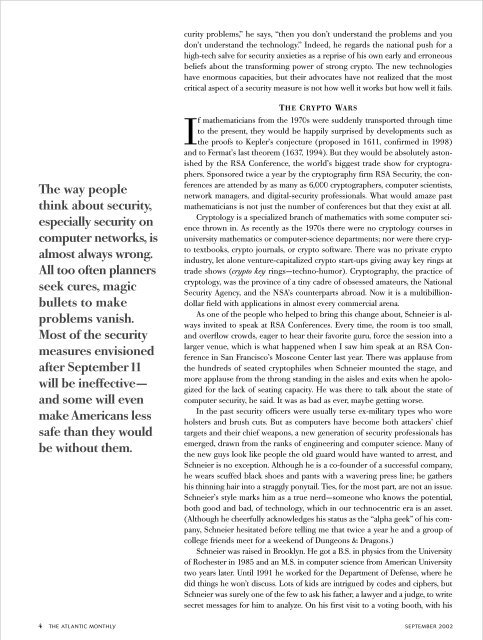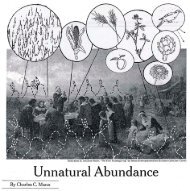HOMELAND INSECURITY - Charles C. Mann
HOMELAND INSECURITY - Charles C. Mann
HOMELAND INSECURITY - Charles C. Mann
You also want an ePaper? Increase the reach of your titles
YUMPU automatically turns print PDFs into web optimized ePapers that Google loves.
Sept-Insecurity.pages 6/28/02 10:37 AM Page 4<br />
The way people<br />
think about security,<br />
especially security on<br />
computer networks, is<br />
almost always wrong.<br />
All too often planners<br />
seek cures, magic<br />
bullets to make<br />
problems vanish.<br />
Most of the security<br />
measures envisioned<br />
after September11<br />
will be ineffective—<br />
and some will even<br />
make Americans less<br />
safe than they would<br />
be without them.<br />
curity problems,” he says, “then you don’t understand the problems and you<br />
don’t understand the technology.” Indeed, he regards the national push for a<br />
high-tech salve for security anxieties as a reprise of his own early and erroneous<br />
beliefs about the transforming power of strong crypto. The new technologies<br />
have enormous capacities, but their advocates have not realized that the most<br />
critical aspect of a security measure is not how well it works but how well it fails.<br />
THE CRYPTO WARS<br />
If mathematicians from the 1970s were suddenly transported through time<br />
to the present, they would be happily surprised by developments such as<br />
the proofs to Kepler’s conjecture (proposed in 1611, confirmed in 1998)<br />
and to Fermat’s last theorem (1637, 1994). But they would be absolutely astonished<br />
by the RSA Conference, the world’s biggest trade show for cryptographers.<br />
Sponsored twice a year by the cryptography firm RSA Security, the conferences<br />
are attended by as many as 6,000 cryptographers, computer scientists,<br />
network managers, and digital-security professionals. What would amaze past<br />
mathematicians is not just the number of conferences but that they exist at all.<br />
Cryptology is a specialized branch of mathematics with some computer science<br />
thrown in. As recently as the 1970s there were no cryptology courses in<br />
university mathematics or computer-science departments; nor were there crypto<br />
textbooks, crypto journals, or crypto software. There was no private crypto<br />
industry, let alone venture-capitalized crypto start-ups giving away key rings at<br />
trade shows (crypto key rings—techno-humor). Cryptography, the practice of<br />
cryptology, was the province of a tiny cadre of obsessed amateurs, the National<br />
Security Agency, and the NSA’s counterparts abroad. Now it is a multibilliondollar<br />
field with applications in almost every commercial arena.<br />
As one of the people who helped to bring this change about, Schneier is always<br />
invited to speak at RSA Conferences. Every time, the room is too small,<br />
and overflow crowds, eager to hear their favorite guru, force the session into a<br />
larger venue, which is what happened when I saw him speak at an RSA Conference<br />
in San Francisco’s Moscone Center last year. There was applause from<br />
the hundreds of seated cryptophiles when Schneier mounted the stage, and<br />
more applause from the throng standing in the aisles and exits when he apologized<br />
for the lack of seating capacity. He was there to talk about the state of<br />
computer security, he said. It was as bad as ever, maybe getting worse.<br />
In the past security officers were usually terse ex-military types who wore<br />
holsters and brush cuts. But as computers have become both attackers’ chief<br />
targets and their chief weapons, a new generation of security professionals has<br />
emerged, drawn from the ranks of engineering and computer science. Many of<br />
the new guys look like people the old guard would have wanted to arrest, and<br />
Schneier is no exception. Although he is a co-founder of a successful company,<br />
he wears scuffed black shoes and pants with a wavering press line; he gathers<br />
his thinning hair into a straggly ponytail. Ties, for the most part, are not an issue.<br />
Schneier’s style marks him as a true nerd—someone who knows the potential,<br />
both good and bad, of technology, which in our technocentric era is an asset.<br />
(Although he cheerfully acknowledges his status as the “alpha geek” of his company,<br />
Schneier hesitated before telling me that twice a year he and a group of<br />
college friends meet for a weekend of Dungeons & Dragons.)<br />
Schneier was raised in Brooklyn. He got a B.S. in physics from the University<br />
of Rochester in 1985 and an M.S. in computer science from American University<br />
two years later. Until 1991 he worked for the Department of Defense, where he<br />
did things he won’t discuss. Lots of kids are intrigued by codes and ciphers, but<br />
Schneier was surely one of the few to ask his father, a lawyer and a judge, to write<br />
secret messages for him to analyze. On his first visit to a voting booth, with his<br />
4 THE ATLANTIC MONTHLY SEPTEMBER 2002




